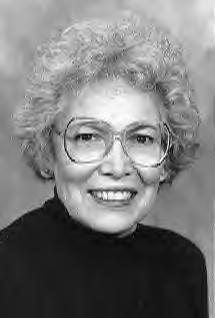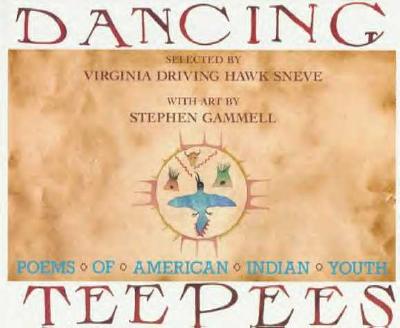|
Canku Ota |
|
(Many Paths) |
|
An Online Newsletter Celebrating Native America |
|
December 30, 2000 - Issue 26 |
|
|
|
South Dakota Author Given Prestigious Award |
|
by Jennifer Sanderson-The Argus Leader |
| The following are President Clinton's remarks as he presented Virginia Driving Hawk Sneve with The National Humanities Medal. |
| "When Virginia Driving Hawk Sneve was a young girl, she came across an old, 20-volume encyclopedia called,
"The Book of Knowledge." She read every one of those tomes, cover to cover, twice. In the years since, her love of words and a deep pride in her Native American heritage have propelled her to write more than 20 books of her own, including several about her Lakota Sioux people. A gifted teacher and story teller, she has devoted the past three decades to educating children and others about Native American culture, to breaking down stereotypes and replacing them with knowledge and understanding. Her stories have helped us to better define the American experience, to understand the Native Americans who were here before the rest of us had the good fortune to have our ancestors arrive. We thank her for sharing her timeless wisdom." |
|
|
 Virginia Driving
Hawk Sneve grew up knowing that unless she created her own "special places," there would be nowhere for
her to feel at home. Virginia Driving
Hawk Sneve grew up knowing that unless she created her own "special places," there would be nowhere for
her to feel at home.On a driving trip to the Black Hills, her family stopped at a gas station with three doors in the rear. "Women" was locked, and she wouldn't venture into "Men," so she threw open the one marked "Indians." Back in the car, Driving Hawk Sneve, then 9, told her parents, "Isn't it nice that there was a special place for Indians?" Her father patted her knee, then said, "My girl, I hope there will always be special places for you." Driving Hawk Sneve, 67, has created her own ever since that 1942 trip. From her childhood on the Rosebud Indian Reservation, through the 1950s and her first teaching job, and two decades later with the printing of her first novel, she built up her place. In all, nearly five decades of teaching, counseling and writing with a cross-cultural message. Today, she'll stand in Constitution Hall within the nation's capital, waiting to feel the solidness of a medal as it leaves President Bill Clinton's hands and settles against her chest. She will be the first South Dakotan ever to wear the National Humanities Medal, one of 12 awarded this year by the National Endowment for the Humanities. Other recipients include fellow authors Toni Morrison and Barbara Kingsolver. President and First Lady Hillary Rodham Clinton will present 12 additional awards to recipients of the National Medal of Arts during the ceremony, which starts at 9:40 a.m. CST. Later, Driving Hawk Sneve and her husband, Vance Sneve, will join the other humanities medal winners at a White House dinner with the Clintons. Driving Hawk Sneve, who left Rapid City for Washington, D.C., earlier this week, could not be reached by phone. Jim Turner, with the National Endowment for the Humanities press office, cited a schedule full of lectures and dinners.  An enrolled member of the Rosebud Sioux Tribe, she learned that women did not call attention to
themselves. They did what was needed. She simply did it through her work. An enrolled member of the Rosebud Sioux Tribe, she learned that women did not call attention to
themselves. They did what was needed. She simply did it through her work.Always, she shared her achievements with her family. Her honor was theirs, as was her shame. "To this day, I am uncomfortable with being publicly recognized for my accomplishments," she wrote in "Completing the Circle." The book traces the lives of her female ancestors, placing family history within the larger framework of well-documented events. It brought her more notice even before it was printed, claiming a prepublication North American Indian Prose Award. "Her work has been so valuable to dispel the stereotypes that have existed about Native American people," says Norma Wilson, the University of South Dakota English professor who nominated Driving Hawk Sneve. "In her fiction, she presents images and characters that are out of real life." Wilson has nominated Driving Hawk Sneve several times over the years, adding to the paperwork as her writing colleague built the list of qualifications. Beginning with the children's book "Jimmy Yellow Hawk" in 1972, Driving Hawk Sneve launched a writing career that now encompasses 20 books and more short stories. While teaching at schools in White and Pierre, she saw a need for literature that shattered American Indian stereotypes and paved the way for adult understanding. "It was only after my daughter Shirley began reading Laura Ingalls Wilder's books that I began writing for children," Driving Hawk Sneve writes in "Completing the Circle." Her daughter, who lives and works in statewide arts from Sioux Falls, was enchanted by a book set in DeSmet. The little town on the prairie wasn't far from the place Driving Hawk Sneve's husband, Vance, grew up. The enthusiasm spread. "Then I read 'Little House on the Prairie' and found the only reference to Indians in the whole series," Driving Hawk Sneve wrote. " 'The naked wild men stood by the fireplace. ... Laura smelled a horrible bad smell. ... Their faces were bold and fierce.' I wondered what ideas my daughter was acquiring about Indians in the fiction she read." Driving Hawk Sneve's time as a counselor at Flandreau Indian School and Rapid City Central High School further cemented her resolve to make clashing cultures meet.  Driving Hawk Sneve has since garnered several awards, including those given by the Council on Interracial
Books and the Western Writers of America. She's a past recipient of the Indian Living Treasure Award, presented
jointly by Northern Plains Tribal Arts and South Dakotans for the Arts. She's also an appointee to the National
Women's Progress Commemoration Commission. Driving Hawk Sneve has since garnered several awards, including those given by the Council on Interracial
Books and the Western Writers of America. She's a past recipient of the Indian Living Treasure Award, presented
jointly by Northern Plains Tribal Arts and South Dakotans for the Arts. She's also an appointee to the National
Women's Progress Commemoration Commission."I couldn't think of anyone who would be more deserving," Wilson says. "I thought it would be wonderful for a South Dakotan, and particularly a Lakota woman, to receive that recognition." Statewide audiences already know Driving Hawk Sneve through her 20 years as a lecturer in the state council's series. Most recently, she appeared as one of three authors in "Dakota Visions II." "When we did that program in Brookings, it was a really large audience, and everybody wanted to talk to her afterward," says Sherry DeBoer, assistant director of administration for the council. Driving Hawk Sneve's ability to find common ground among cultures is part of what makes her such an engaging lecturer for mixed audiences, DeBoer says. Vance Sneve is Norwegian. Growing up, the author's three children called themselves "Siouxwegians." Married 45 years, she's proven that two radically different heritages can peacefully coexist in a space smaller than the Northern Plains. "She has a unique approach of reflecting the cultures from her own experiences," DeBoer says. Michael Haung, the council's executive director, hopes the award will encourage other South Dakotans in a way the council has somehow not yet struck upon in its nearly 30-year history. "She joins a pretty distinguished list, and this is a special day for South Dakota," he says. In addition to Morrison and Kingsolver, Driving Hawk Sneve will share tonight's stage with another strong female voice. Poet Maya Angelou receives recognition in the arts category. Other arts medals winners include classical violinist Itzhak Perlman, singer and filmmaker Barbra Streisand and dancer Mikhail Baryshnikov, who received one of the annual Kennedy Center honors earlier this month. "It really is a big deal, and we're proud of her," says Janet Brown, director of South Dakotans for the Arts. "It's a very prestigious award, but unlike the Kennedy Center Honors, it's not televised, so people don't know it as well." Driving Hawk Sneve's latest book, "Grandpa Was a Cowboy & An Indian," is available now through the University of Nebraska Press. |
|
Voices From the
Gap |
|
Sneve
to Receive 1997 Living Indian Treasure Award |
|
The Annual Joseph Harper Cash
Memorial Lecture, Fall 1997 |
|
|
|
|
| Canku Ota is a free Newsletter celebrating Native America, its traditions and accomplishments . We do not provide subscriber or visitor names to anyone. Some articles presented in Canku Ota may contain copyright material. We have received appropriate permissions for republishing any articles. Material appearing here is distributed without profit or monetary gain to those who have expressed an interest. This is in accordance with Title 17 U.S.C. section 107. |
|
Canku Ota is a copyright © 2000 of Vicki Lockard and Paul Barry. |
|
The "Canku Ota - A Newsletter Celebrating Native America" web site and its design is the |
|
Copyright © 1999, 2000 of Paul C. Barry. |
|
All Rights Reserved. |